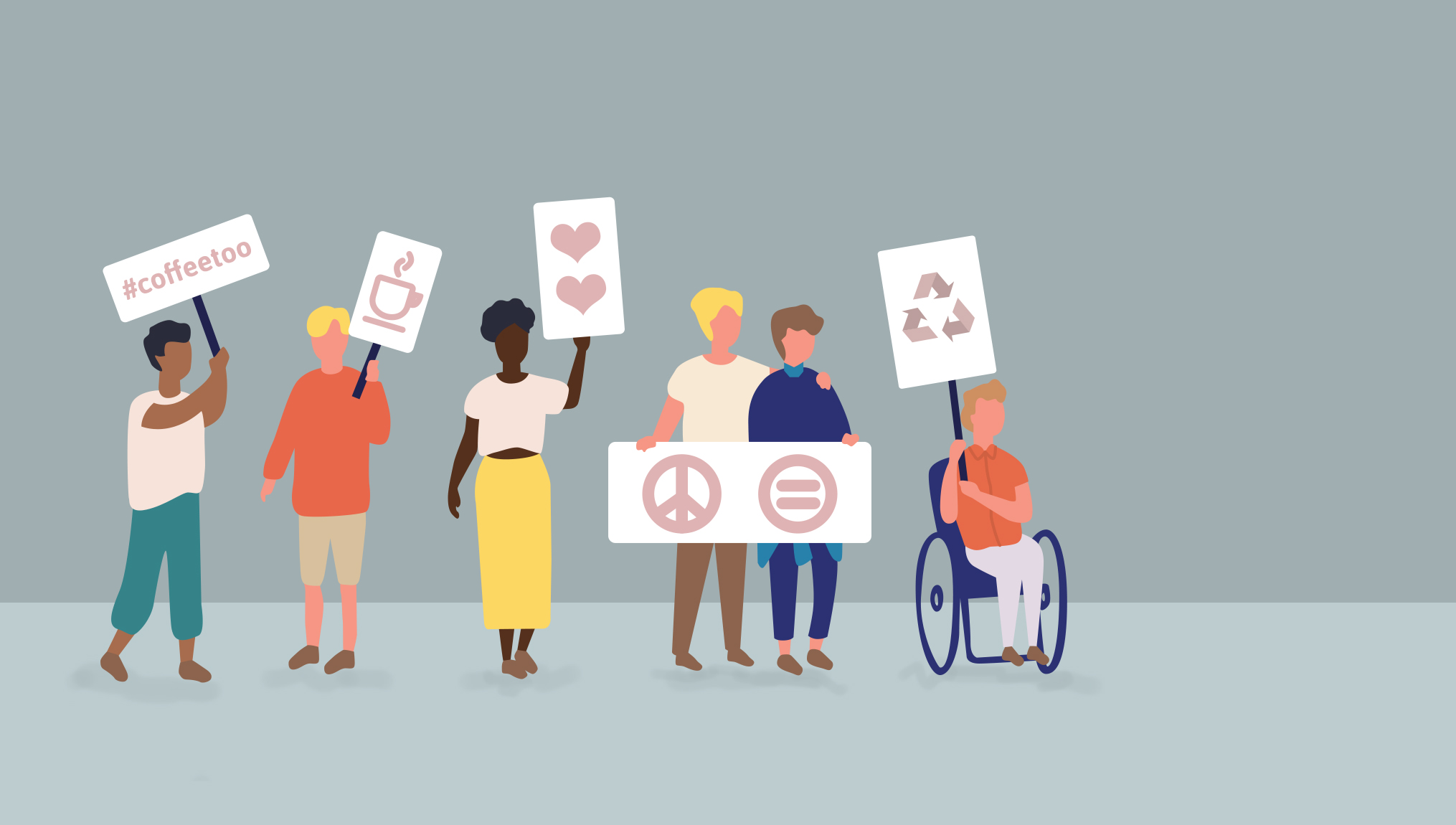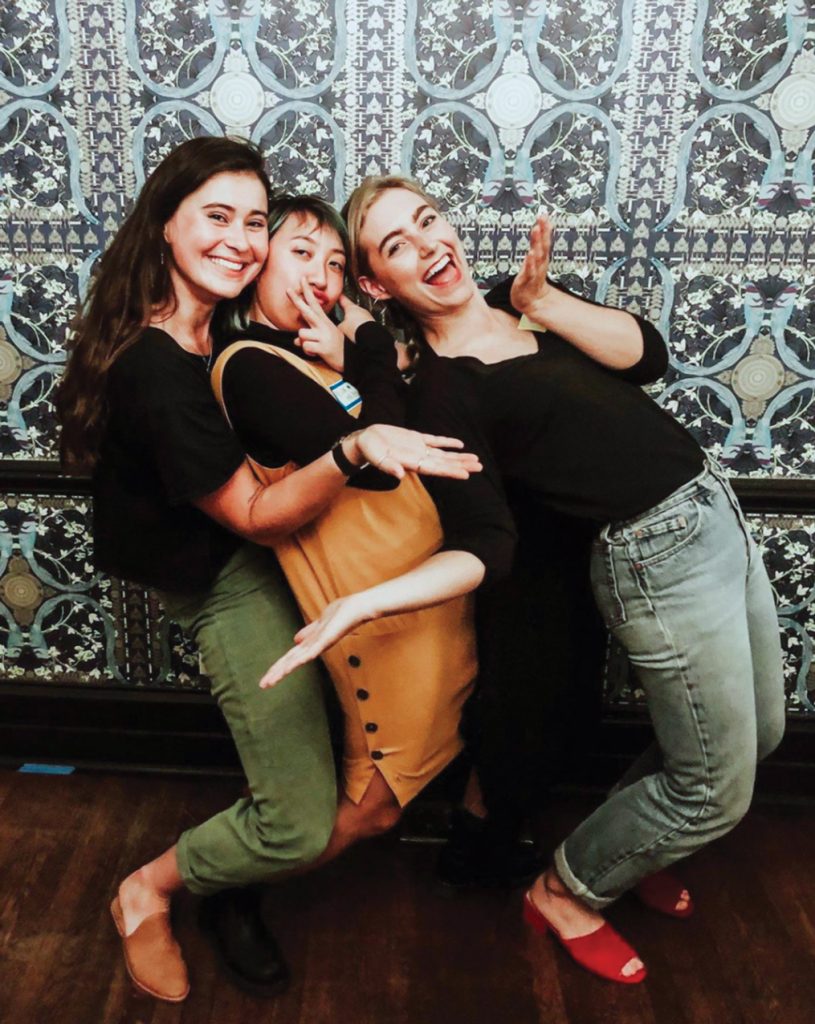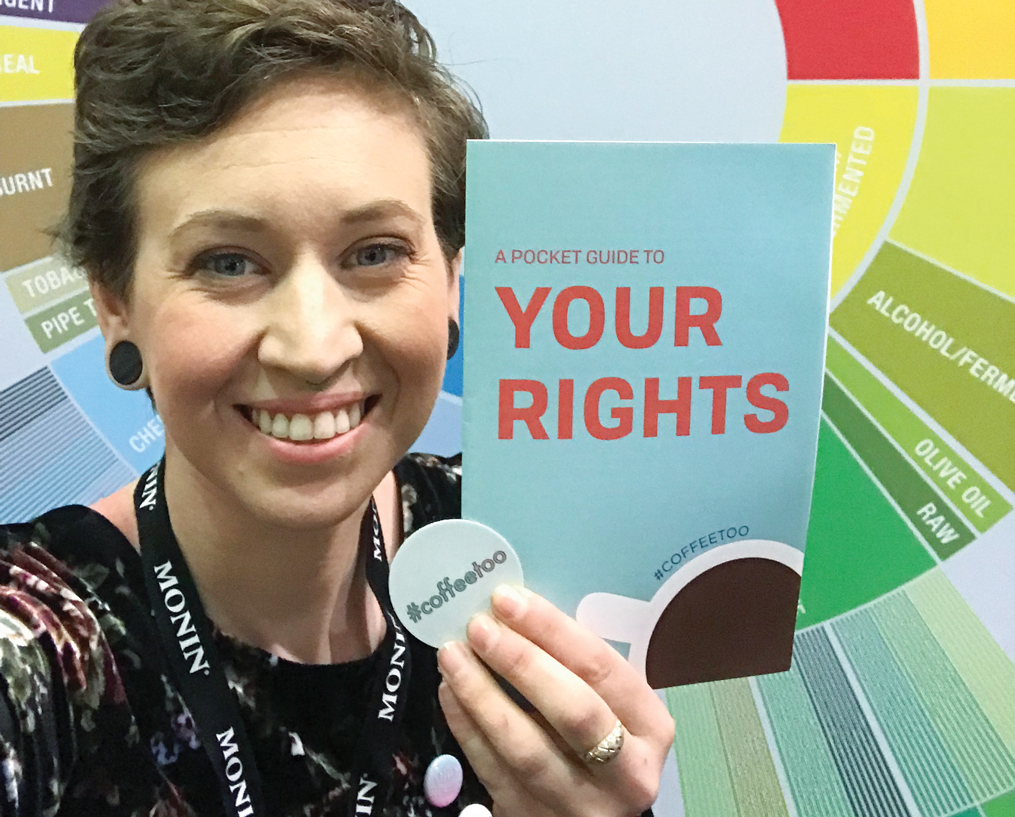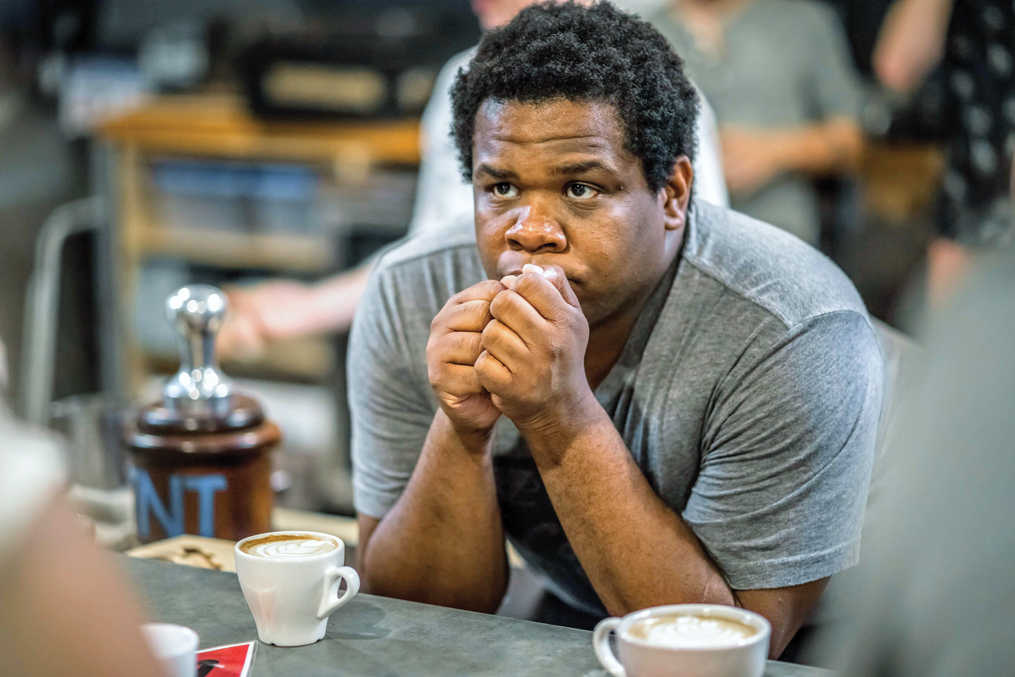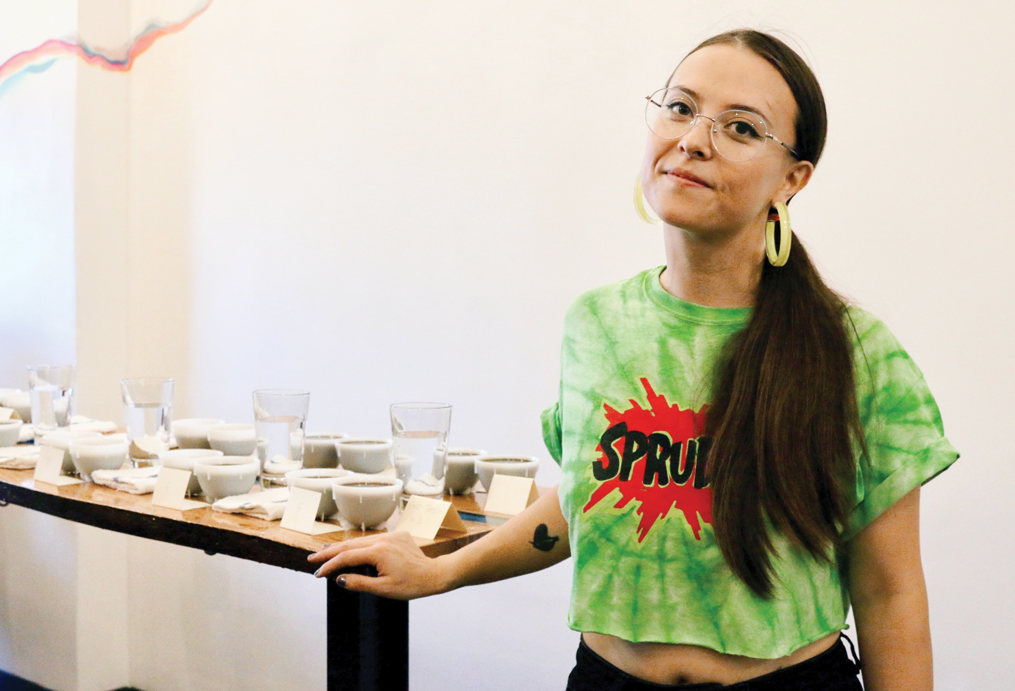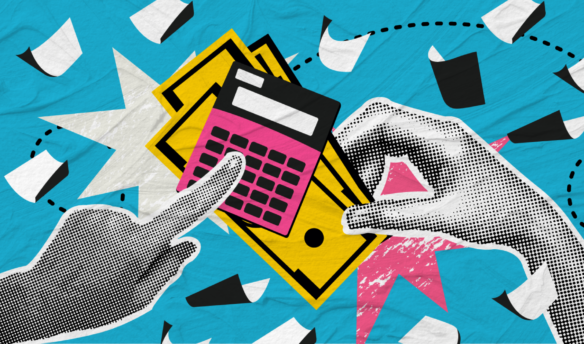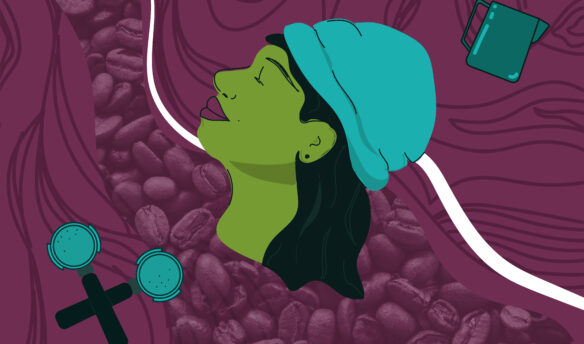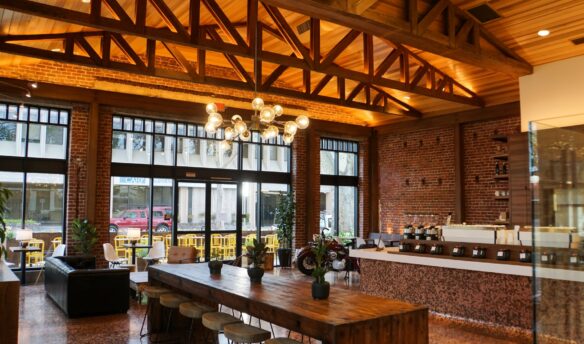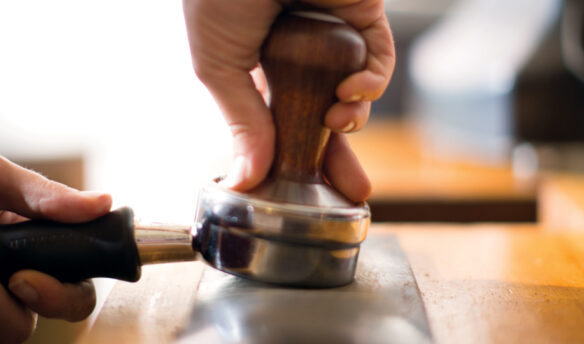Nothing quite dominated coffee news in 2019 like barista-led activism. Three café walkouts happened in Seattle alone.
Instagram activism and wage transparency surveys connected baristas across the nation. Camila Coddou launched her project, Barista Behind the Bar. Umeko Motoyoshi, creator of the Rainbow Cupping Spoon Project, dropped their influential book, The @wastingcoffee Guide To Not Wasting Coffee, and facilitated events that challenged the oft-prioritized voices in the industry. Around the country, coffee workers were communicating, organizing, educating themselves, and addressing issues about discrimination and harassment in the workplace. Coffee culture had reached a tipping point.
A galvanizing moment was when five employees walked out of Slate Coffee Roasters in Seattle on June 22, 2019, citing, among other things, missing wages and a toxic work environment. They regrouped at a nearby café and launched the Instagram account @coffeeatlarge (CAL). One of the founders, Felix Tran, remembers saying, “‘If the Instagram page got maybe 100 followers, I’ll commit to growing the organization.’ Rather, we received 5k followers within a day!”
CAL was overwhelmed with support and solidarity, and many followers shared stories of workplace injustices similar to their own.
“Our following in social media is only a reflection of how prolific the problems in this industry are,” says CAL’s Rachel Hopke.
2019 may have been the year barista activism broke major headlines, but it certainly didn’t just appear overnight. Barista-led activism happens when baristas (or former baristas, roasters, or other coffee workers) raise awareness, organize, fundraise, or have an action or demonstration on behalf of worker issues. Worker-activists also host classes, network, or even form nonprofits or unions.
Q grader, writer, educator, and entrepreneur Motoyoshi says, “This movement has been a long time coming, and it built on itself through the individual and collective efforts of many people all paving the way for each other through interrelated works.”
A History of Recent Barista Activism
The groundwork for recent events can be traced back to a few years ago. In 2016 and 2017, coffee professional Michelle Johnson and coffee writer Ashley Rodriguez started writing about race and gender in the coffee industry. Johnson’s blog, The Chocolate Barista, and event series, Black Coffee, facilitate dialogue around race and draw on her own experiences as a Black woman in specialty coffee. In 2017, Rodriguez and Jasper Wilde founded Boss Barista, an award-winning intersectional feminist podcast.
“For the first time, the coffee community began to admit that we have problems, that our spaces are unsafe for many people. Previously these conversations were extremely taboo in the industry.”
Motoyoshi notes that Johnson’s and Rodriguez’s work “radically shifted the coffee landscape in an extremely short time, creating conversations about identity, power, and marginalization. For the first time, the coffee community began to admit that we have problems, that our spaces are unsafe for many people. Previously these conversations were extremely taboo in the industry.”
One of those taboo topics was speaking out against workplace harassment, a subject tackled by #coffeetoo. Having worked in coffee for more than 14 years, Molly Flynn laid the groundwork for the grassroots organization #coffeetoo on October 14, 2017, “the day before the #MeToo movement shifted from Tarana Burke’s much-needed usage of the hashtag to the present-day post-Weinstein usage of it,” she notes.
#coffeetoo focused on three questions: What are our rights as employees? What can we do if our rights have been violated? How can we take care of ourselves if we’ve been put through an unwanted situation? They provided answers to those questions through their booklet, A Pocket Guide To Your Rights.
“For about a year or so we printed copies of these for free and shipped them all over the United States—and even the world!” says Flynn.
The booklet has been widely distributed and is digitally available for free at CoffeeTooProject.com.
A Boss Barista podcast with Molly Flynn about #coffeetoo partly inspired Demelza Jones’ SAME CUP organization in Australia, which launched in the fall of 2018. SAME CUP provides education and networking opportunities to women, queer people, and other minorities in Australia’s specialty coffee scene, and has enabled more women to participate in coffee competitions, raised funds for women in Rwanda, and provided coffee outreach to rural communities.
Taking a stand against workplace harassment, former employees of Bay Area’s Four Barrel Coffee, including Motoyoshi, filed a lawsuit in January 2018 against the company for sexual assault and harassment. The lawsuit was settled, with founder Jeremy Tooker resigning, and remaining partners promising to divest from the company and turn it into an employee-owned business.
“[The lawsuit] helped many baristas in similar situations identify that they too could band together and stand up against workplace injustices,” says Motoyoshi.
Other groups, like DMV Coffee, have affected positive change on coffee culture. Though not a new organization, DMV serves coffee workers in the greater D.C. area, Southern Maryland, and Northern Virginia. They just passed their 11th year hosting the nation’s longest-running Thursday Night Throwdowns (TNTs). DMV also puts together networking events like happy hours and multi-roaster cuppings.
Coffee professional Adam JacksonBey, who has been involved with DMV for over five years, credits their code of conduct as one tool that makes events welcome to everyone. The code ensures DMV events will be free of harassment, including unwanted verbal comments relating to race, gender, body size, and sexual orientation, and unwanted sexual attention. DMV’s leadership, which has grown from five to seven board members, centers non-white and other coffee workers from marginalized identities.
A newer organization, the Kore Directive, launched in November 2018. Founded by Sierra Burgess-Yeo, Kore hosts panels, workshops, networking events, and other happenings designed to empower women in London’s coffee community. Burgess-Yeo spent much of her barista career frustrated by the inaccessibility of furthering her coffee education and consistently seeing positions of power given to men, which no one else seemed to question.
“It is literally a non-issue and that’s the dangerous bit,” she tells Fresh Cup.
The emergence of two coffee worker unions also made big strides for barista activism: Ithaca-based Gimme! Coffee’s barista union and the Washtenaw Area Coffee Workers’ Association (WACWA) both formed in 2018.
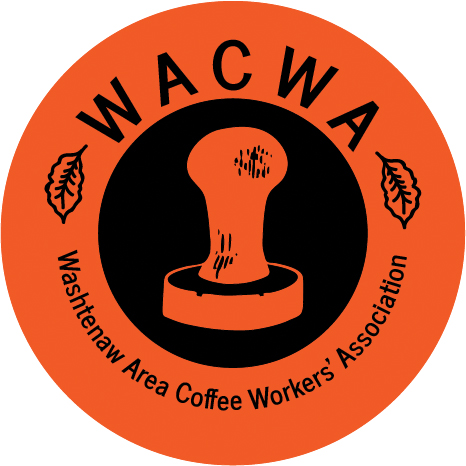
“For every visible group like ours that formally organizes and takes public action, there are probably nine or ten that are out there meeting privately at the moment, planning and building solidarity one barista at a time in the shops where they work,” says Alec Hershman, WACWA’s lead organizer. “I think there’s a groundswell owing to the systematicity of the problems (low wages, harassment, discrimination) that baristas across the world face on a daily basis, and the accelerating degree to which we baristas are professionalizing ourselves and talking about the skill involved in the labor we perform.”
Last Year’s Activism
This year not only saw the continuation of labor organizing and group and individual activism, but also café walkouts and protests. Early in the year, current and former employees of Portland’s Ristretto Roasters, including Camila Coddou, signed an open letter in protest of their employer’s YouTube video channel questioning victims of rape and challenging other prominent #MeToo figureheads.
Coddou went on to launch Barista Behind the Bar, traveling around the country in a converted Sprinter van interviewing baristas. She now speaks about equitable café practices.
Motoyoshi hosted events “Changing Structures” and “Subjective Objectivity.” The former was a panel discussion with industry professionals who are challenging conventions in the coffee world, while “Subjective Objectivity” was “equal parts sensory training and social power dynamics,” explains Motoyoshi. “Many people of color grow up eating foods specific to our cultures, and our sense memory banks are informed by that. But in majority white coffee settings, our tasting notes sometimes fall outside of what others recognize and end up ignored or invalidated.”
After the Slate Coffee Roasters walkout, CAL had three events, including “Get To Know Coffee At Large,” and co-facilitating the “Badass Barista Throwdown,” with proceeds going to Glitter Cat Barista Bootcamps. They also endorsed a second CAL chapter in Cincinnati, @bitchy.baristas.
“We want to elevate and support anyone standing up to discrimination or unfair treatment in their locale,” says Hopke. “That usually looks like an individual or group keeping in touch via email, we repost their initiatives, or sending a small group who’s experiencing a bad work culture steps to organize, or becoming a more formal ‘chapter of CAL’ if they desire.”
On October 2, former employees and community members protested at Seattle’s iconic Caffe Vita. The demonstration was in response to the firing of three employees for allegedly giving day-old pastries to the homeless; at least seven other workers quit in solidarity. The protest included distributing hundreds of flyers that decried Vita’s firings, which were without warning, disciplinary action, or constructive dialogue, and demanded accountability.
@stl.dial.in is another activist-oriented Instagram profile, this time for the St. Louis coffee community to address issues in the workplace. To quote a caption from their first Instagram post: “Our desire is not to tear down organizations that people rely on for income and community. Rather it is to systematically dismantle the culture of misogyny, homophobia, sexism, racism, xenophobia and disparities that finds its way into the industry all too often.”
Inspired by museum employees who started similar wage surveys in May, a Philadelphia-based barista started a local wage survey, collecting data about wages and benefits for coffee workers.
Wage transparency surveys, publicly shared via Google Docs, cropped up in barista communities nationwide in October. Inspired by museum employees who started similar wage surveys in May, a Philadelphia-based barista started a local wage survey, collecting data about wages and benefits for coffee workers. Other cities soon followed suit.
In the third Seattle café walkout of the year, employees of indi Chocolate in Seattle’s Pike Place Market staged a walkout on November 4, taping a letter, signed by nine employees, on the doors of the company. Some of the reasons for the walkout cited in the letter include lack of transparency with wage information, discriminatory treatment toward employees due to race and gender, and employees being overworked and expected to forgo breaks. The walkout happened after, according to the letter, “many avenues of communication were exhausted before we realized that a collective action would be the only way to insure our concerns were heard.”
What’s Next
The events of last year, and others in the years before, are, in the words of JacksonBey, only “the tip of the spear. I think that baristas knowing and recognizing their power are an important first step in making true change in this industry.”
“The future of barista-led activism is more of it!” exclaims Hershman. “As customer-facing service employees and stewards of our towns’ third places, we’re in a particularly good position to raise labor literacy in the communities we serve.”
For WACWA and the Gimme Baristas’ Union, that means showing up in solidarity for other labor and union events. WACWA is in the early stages of designing a pop-up workers’ center in Washtenaw County to educate workers about building solidarity in the workplace, and have just applied for a community building grant. If approved, they hope to host quarterly speaker and workshop series in 2020.
CAL is currently pending nonprofit status. They have expanded their volunteer team to keep up with their ambitious future projects, including a podcast, zine, and the newly created Free School, a collaborative effort with Seattle coffee professionals and cafés to host free coffee education classes.
Flynn put #coffeetoo on indefinite hiatus. She admits her volunteer work on the project depleted her of time, money, and mental and physical health. Flynn is the first to say “Take. Care. Of. Your. SELF!” when it comes to activist work. She says one encouraging thing about the hiatus is watching other groups take on the mantle in different ways.
“When #coffeetoo went on break, I wasn’t sure anything more would happen,” says Flynn. “It honestly felt a little futile. It’s pretty awe-inspiring to see the brave and determined people who have come forward in the past year to face head-on the challenges that we as a community need to overcome.”
The hospitality industry in general has its share of poor working conditions, which leads to high turnover rates. In specialty coffee however, that’s slowly changing as baristas recognize that issues of harassment, lack of wage transparency, and race and gender inequalities aren’t relegated to one café. Baristas are more willing than ever to organize, network, and take action. It’s safe to say that barista activism is here to stay.



